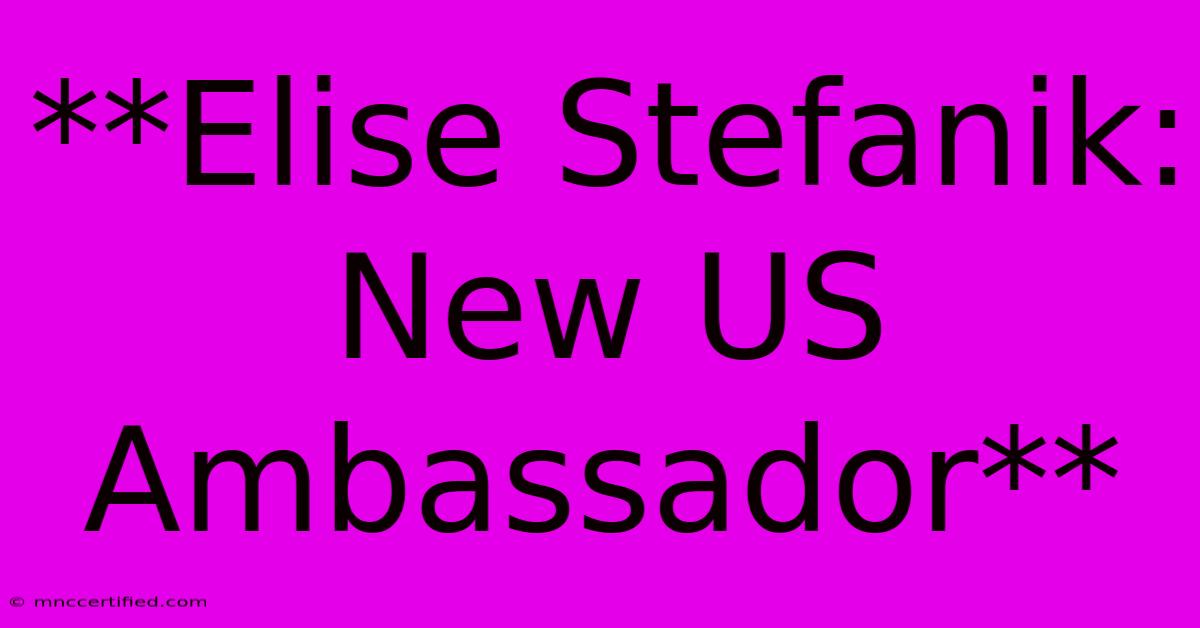**Elise Stefanik: New US Ambassador**

Table of Contents
Elise Stefanik: A New Era in US Diplomacy?
Elise Stefanik, a prominent Republican Congresswoman from New York, has been nominated by President Biden to serve as the US Ambassador to the United Nations. This nomination has sparked much debate and discussion, raising questions about her qualifications, political leanings, and potential impact on US foreign policy.
A Rising Star in Republican Politics
Elected to the US House of Representatives in 2014 at the age of 30, Elise Stefanik quickly rose through the ranks of the Republican Party. She became the youngest woman to serve as a member of the House Republican leadership and has been a vocal advocate for conservative policies. Stefanik has gained national recognition for her strong stances on issues such as economic growth, national security, and educational reform.
A Controversial Figure
Stefanik's political career has not been without controversy. Her vocal support for former President Trump and her defense of his actions during the January 6th Capitol riot have drawn criticism from both Democrats and some within her own party. She has also been accused of spreading misinformation and promoting divisive rhetoric.
From Congress to the UN
Stefanik's nomination to the UN has raised eyebrows, as she has limited experience in diplomacy and foreign policy. Her previous work on the House Armed Services Committee and her involvement in national security issues have been cited as relevant experience, but critics argue that she lacks the necessary diplomatic skills and knowledge of international affairs to lead the US delegation at the UN.
A Potential Shift in US Foreign Policy?
Stefanik's appointment could signal a shift in US foreign policy, particularly in terms of its approach to multilateralism and global alliances. As a staunch supporter of Trump's "America First" agenda, she has criticized multilateral agreements and international institutions, suggesting a potential move towards a more unilateralist approach to foreign policy.
The Road Ahead
It remains to be seen how Stefanik's nomination will unfold. Her confirmation process is likely to be contentious, with Democrats raising concerns about her qualifications and her past statements. If confirmed, Stefanik will face the challenge of navigating the complex and often-contentious world of international diplomacy and representing the US on the global stage.
Conclusion
Elise Stefanik's nomination as US Ambassador to the UN is a significant development with potential implications for US foreign policy. Her controversial past and lack of diplomatic experience have raised questions about her suitability for the role, while her staunchly conservative views suggest a potential shift in US foreign policy. The coming months will be crucial in determining whether Stefanik can overcome these challenges and effectively represent the United States at the UN.
Keywords: Elise Stefanik, US Ambassador, UN, Republican Party, Congresswoman, Foreign Policy, Diplomacy, International Relations, Multilateralism, Unilateralism, Trump, January 6th, Controversy, Qualification, Nomination, Confirmation Process.

Thank you for visiting our website wich cover about **Elise Stefanik: New US Ambassador**. We hope the information provided has been useful to you. Feel free to contact us if you have any questions or need further assistance. See you next time and dont miss to bookmark.
Featured Posts
-
Kerasilk Strengthening Bond Builder
Nov 12, 2024
-
Veterans Day Holiday Closures 2023
Nov 12, 2024
-
Ceremony Honors Fallen Clark County Marine
Nov 12, 2024
-
Pedrovazpaulo Real Estate Investment
Nov 12, 2024
-
Referee Coote Suspended Klopps Outburst
Nov 12, 2024